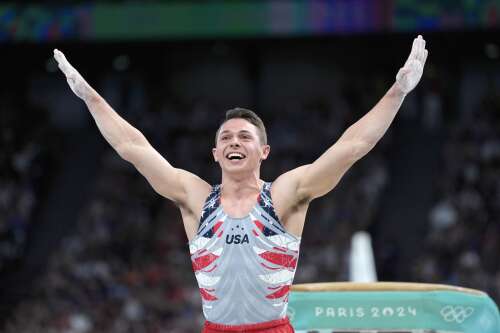Stevenson graduate Paul Juda helped the United States’ men’s gymnastics team to a bronze medal Monday at Bercy Arena at the 2024 Summer Olympics in Paris, France.
AP
Leading off his team in all four events he competed in Monday at the Olympic men’s gymnastics team final in Paris, Stevenson graduate Paul Juda helped the United States earn bronze, its first medal in the event in 16 years.
As his parents, Jozef and Ewa, watched from the stands at Bercy Arena, Juda opened his competition in the second rotation of events, the vault. He scored 14.666, better than his mark in the July 27 team qualification round. Juda’s vault execution score Monday was 9.466.
The Deerfield native scored a 13.366 on the horizontal bar. In the U.S. team’s fifth rotation, floor exercise, Juda scored 14.200, again bettering his qualifying mark.
In 14 of 18 routines, the United States gymnasts posted higher scores than they did in the qualifying round on Saturday.
“We talked about emptying out the tank today, and making sure that we left nothing on the floor,” Juda said on NBC. “I’m pretty positive that we did that, and now we’ve got this (bronze medal) to show for it.”
In the final rotation for the U.S., Juda capped his performance on pommel horse with a score of 13.900 including an execution score of 8.600.
“Every time on almost every event the U.S. men needed a big start, and Paul Juda delivers,” said NBC gymnastics analyst Tim Daggett.
The Japanese men’s gymnastics team claimed Olympic gold with an epic comeback over its top rival.
With China poised to claim its first Olympic title in 12 years with one rotation to go, Japan surged ahead to win the Paris Olympics men’s team competition Monday after an intense and nail-biting duel.
The Japanese, which trailed by more than three points going into the last apparatus, overtook their rivals after China’s Su Weide fell twice off the horizontal bar and Xiao Ruoteng underperformed under pressure. Japan won with a small margin of 0.532 points.
Su also botched a landing on vault earlier in the evening. He took the blame for the bitter defeat.
“Today taught me a big lesson,” Su said. “It’s a big regret. I feel sorry for my senior partners in the team. They have worked very hard in this cycle, there were a lot of injuries in the buildup, and because of my errors today, we lost the gold medal.”
Behind the two powerhouses of men’s gymnastics and in the absence of Russia, the Americans earned bronze for their first medal since 2008.
The Chinese had dominated qualifying ahead of Japan, the reigning world champion.
They faced off in the same group, starting their competition on floor exercise. Su’s mistake on vault aside, China had been consistent on all apparatuses and took the lead midway through the competition.
In the penultimate rotation, Zhang Boheng posted an impressive 15.100 on the parallel bars and teammate Zou Jingyuan did even better with a rare 16.000.
But Japan always felt it could turn things around. Takaaki Sugino, Shinnosuke Oka and Tokyo Olympics all-around champion Daiki Hashimoto helped the comeback with excellent displays on the horizontal bar, while Sue faltered.
It was Japan’s eighth team gold and first since Rio de Janeiro in 2016.
After qualifying in fifth place, the U.S. men ended a 16-year drought to the delight of the dozens of fans waving American flags who chanted “USA! USA!” throughout the evening.
The Americans posted a total of 257.793 points to edge Britain for the bronze. Frederick Richard and Brody Malone were at the top of their game, and every member of the U.S. team contributed. Stephen Nedoroscik, the pommel horse specialist, joined his teammates on the final rotation.
“I had my coach by my side and he does a great job of taking the nerves out of (me) and he hypes me up,” Nedoroscik said. “But these guys hit every routine before me and I have a statistic — when people hit before me, I also hit. So I went out there and did my job and I enjoyed the moment.”
Russia, which won gold at the Tokyo Games, did not compete because of its role in the war against Ukraine.
Hashimoto, who had appeared to be dealing with right shoulder discomfort during qualifying, fell midway through his pommel horse routine. He finished better but put on a somber face after his dismount. He briefly put his head in his hands, knowing that his mediocre score would dent his team’s hopes of a gold medal.
Hashimoto recovered quickly and delivered an excellent vault. After getting a massage, he then capped his evening with a great routine on the horizontal bar after failing to qualify for the eight-man apparatus final.
“Even though there were some errors in our routines, we kept on motivating each other,” Hashimoto said. “I used the passion of my teammates on my final routine on the high bar.”
After Hashimoto’s turn, Zhang had a chance to put China back in charge but his score was not enough.
“In the last part we did not perform as well as we should have. We end with a silver medal, we are indeed frustrated,” Zhang said.
The women’s final, featuring seven-time Olympic medalist Simone Biles, takes place on Tuesday.
Staff writer Dave Oberhelman contributed to this report
